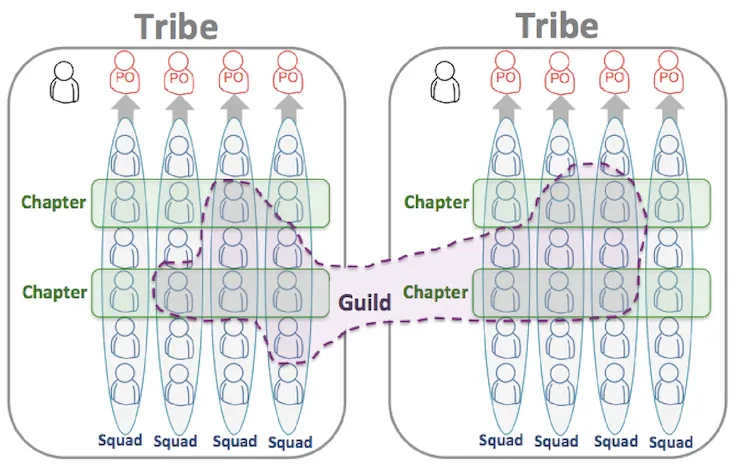Scaling your Startup’s Development Team- (Case Studies Included)
This article explores a few key insights put together by our team, along with case studies on how startups can effectively scale their software development teams to support their growth.

Discover proven strategies to scale your startup's development team and drive success effectively. Learn from industry experts at Masai School.
Scaling your development staff has the potential to alter the game in the fast-paced startup sector completely. As your startup expands, you'll need a capable and effective development team. This post will look at methods for scaling your startup's development workforce successfully.
For seed or series A startups, scaling is of course the first priority. And thereby, scaling your development team in a sustainable and productive manner becomes a critical aspect of your strategy.
In today’s times when hiring the talent you want is another Achilles’ heel, how do you plan to accomplish that?
How do you augment your current resources in a manner that aligns with your overall business goals and positively impacts your bottom line?
With the right team size and structure, startups can efficiently tackle complex projects, deliver high-quality software, and accelerate their business growth.
In this article, we explore a few key insights put together by our team, along with case studies on how startups can effectively scale their software development teams to support their wider business objectives and bottom line, and continue on the growth treadmill.
The Need for Scaling
Startups face unique challenges in software development, including tight deadlines, changing requirements, and limited resources. As the business grows, these challenges become more pronounced, necessitating the need for scaling the development team.
According to industry leaders, the right team size can have a significant impact on the success of a startup. For example, Slack, a widely-used team collaboration platform, successfully scaled its development team from 8 to over 100 members within a few years, resulting in rapid product development, a growing user base, and increased revenue. By 2019, Slack had over 10 million daily active users and over $400 million in annual revenue.
As Apple co-founder Steve Jobs said,
"Great things in business are never done by one person. They're done by a team of people."
And to help you build that aspirational team who are willing to go far and beyond for your startup's growth as well as for their own career trajectory, here are a few gospels to keep in mind:
Hire for Cultural Fit
Hiring is not just about technical skills, but also about finding team members who align with the company's values and culture. This ensures that new hires can quickly adapt to the team dynamics and work cohesively towards the common goal.
For example, when Netflix was scaling their development team, they looked for candidates who were not only skilled in their respective domains but also aligned with the company's collaborative and innovative culture. This helped them build a cohesive and high-performing team.
Netflix's unique culture is highlighted in their widely known culture document, which emphasizes the importance of hiring and retaining top talent that can thrive in a high-performance environment. By ensuring that new hires share the company's core values, Netflix has been able to maintain a strong team dynamic and successfully scale its development team to support its rapidly growing streaming service.
(Here's an interesting podcast on 'why culture matters' by Netflix's co-founder Reed Hastings)
Invest in Onboarding and Training
Proper onboarding and training are crucial to ensure that new team members can quickly become productive contributors. This includes providing thorough orientation, mentoring, and hands-on training on tools, processes, and technologies used in the company. Here are a few tips for an improved onboarding strategy:
- Your onboarding plan should outline key milestones, training sessions, and meetings with team members and stakeholders to provide a clear roadmap for the newcomer's integration into the team.
- Ensure that new hires understand the company's products, services, and target industries. Organize knowledge-sharing sessions to familiarize them with the domain and the company's unique value proposition.
- Facilitate collaboration between new hires and members from different departments. This not only helps in understanding the bigger picture but also fosters a sense of teamwork and unity across the organization.
- Monitor the progress of new hires during the onboarding process and evaluate the success of the onboarding program. This data-driven approach will help identify areas for improvement and ensure that the onboarding process is continuously optimized.
Stripe, a leading fintech company providing online payment processing solutions, implemented a comprehensive mentorship program as part of their onboarding process. This program, called "Stripe Atlas," helped new hires quickly understand the company's development practices and technologies, allowing them to contribute effectively to the team from day one.
By pairing new employees with experienced Stripe team members, the company ensured that newcomers had a reliable point of contact to guide them through their initial weeks. This mentorship approach accelerated the learning curve for new hires and fostered a sense of belonging within the team. The success of Stripe's onboarding process has been a contributing factor to their rapid growth and continued leadership in the fintech space.
Embrace Agile Methodologies
Agile methodologies, such as Scrum or Kanban, can facilitate effective team collaboration, communication, and project management.
Implementing agile practices can help startups iterate quickly, adapt to changing requirements, and deliver high-quality software in a timely manner.
As Eric Ries, the author of The Lean Startup, stated,
"The only way to win is to learn faster than anyone else."
Agile practices are particularly effective for scaling startups because they promote flexibility, collaboration, and continuous improvement. Some key advantages of using agile methodologies for scaling a startup include:
- Faster decision-making - Agile methodologies encourage making decisions based on real-time data, which enables startups to respond quickly to market changes and customer needs.
- Streamlined processes- Agile methodologies emphasize the elimination of waste and focus on delivering value to the customer.
- Continuous improvement- Agile practices promote a culture of continuous improvement, where teams regularly assess their performance and make necessary adjustments.
Spotify, a leading music streaming platform, is an excellent example of a company that successfully leveraged agile methodologies while scaling its development team. As Spotify grew, they adopted the Spotify Model, a unique agile framework that emphasizes cross-functional teams (called squads), autonomous decision-making, and continuous learning.

The Spotify Model helped the company maintain a nimble, startup-like culture even as it expanded rapidly, allowing them to continue delivering innovative features and improving their platform.
Foster a Collaborative Team Culture
Building a collaborative team culture is essential for productive software development. Encouraging open communication, knowledge sharing, and cross-functional collaboration can foster innovation, creativity, and problem-solving.
As Marissa Mayer, former CEO of Yahoo, said,
"When you need innovation, you need collaboration."
Here are a few unique tips or models startups can try to foster a collaborative team culture:
- Create cross-functional teams:
- Hold regular brainstorming sessions:
- Implement a "no-blame" culture:
- Use collaboration tools and platforms
- Encourage informal team interactions
For instance, Atlassian, a leading provider of collaboration software, emphasizes a collaborative team culture where team members freely share ideas, learn from each other, and work together towards common goals.
Atlassian promotes collaboration through various initiatives, such as 'ShipIt Days' where employees have 24 hours to work on any project they choose, fostering innovation and teamwork. They also use their own suite of collaboration tools, like Jira and Confluence, to keep team members connected and facilitate effective communication.
This collaborative approach has helped Atlassian streamline their development processes, accelerate product delivery, and maintain a strong company culture even as they've grown into a global organization.
Prioritize Communication and Documentation
Effective communication is critical when scaling a development team. Establishing clear communication channels, regular team meetings, and documentation processes can ensure that everyone is on the same page and aligned toward the overall objectives.
This can be achieved through tools like project management software, team chat platforms, and documentation platforms.
Strategies for Scaling Your Startup's Development Team
- Recruitment and Talent Acquisition
- Start by identifying the specific skills your team needs to scale effectively.
- Use industry-specific job boards and networking events to find top talent.
- Leverage platforms like Masai School to access a pool of pre-trained developers, saving time and resources on training.
2. Effective Onboarding
- Develop a structured onboarding process to ensure new team members quickly become productive.
- Provide clear guidelines, access to documentation, and mentorship to help newcomers integrate seamlessly.
3. Remote Teams and Outsourcing
- Consider the benefits of remote developers or outsourcing for specific projects to access a broader talent pool and cost savings.
4. Continuous Learning and Skill Development
- Encourage your team to continuously update their skills and stay up-to-date with the latest technologies.
- Offer opportunities for training and development to foster a culture of growth.
5. Scalable Infrastructure
- Invest in tools and technologies that can handle the growth of your development team, such as cloud-based platforms and project management software.
6. Effective Communication
- Implement robust communication channels to ensure everyone is aligned on project goals and progress.
- Regular meetings and collaboration tools can help bridge geographical gaps in remote teams.
7. Performance Metrics
- Establish key performance indicators (KPIs) to track your development team's performance.
- Make informed decisions regarding team size and structure using data-driven insights.
Conclusion
The dynamic and competitive nature of the startup ecosystem demands that businesses adapt and evolve continuously. To thrive in this landscape, startups must not only focus on building innovative products but also on cultivating high-performing tech teams that can effectively scale with the organization.
Here are a few clear-cut actionable one can keep in mind:
- Foster a culture of continuous learning and improvement: Encourage team members to stay up-to-date with the latest industry trends and technologies, and create opportunities for professional development and growth.
- Leverage data-driven insights: Use data and analytics to inform decision-making, optimize processes, and identify areas for improvement within your team and organization.
- Establish clear goals and metrics for success: Set realistic, measurable objectives for your development team, and monitor progress to ensure alignment with your overall business strategy.
- Promote innovation and creative problem-solving: Create an environment that encourages experimentation and rewards risk-taking, empowering your team to push the boundaries of what's possible.
Embracing a holistic approach that emphasizes both technical excellence and a strong, collaborative team culture is the key to unlocking long-term success and resilience.
That’s all for now. We hope you’ll implement some of these strategies(if you haven’t already) and scale your team the right way. Cheers!
FAQs
How do I determine when it's the right time to scale my development team?
The right time to scale your development team depends on various factors, including increased customer demand, expanded project requirements, and available resources. A clear indicator is when your existing team struggles to keep up with workload or project deadlines.
Can I scale my development team with remote developers?
Absolutely. Scaling with remote developers is a viable option, allowing you to tap into a global talent pool and potentially reduce costs. Effective communication and collaboration tools are key to success when working with remote teams.

